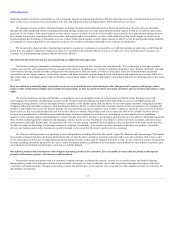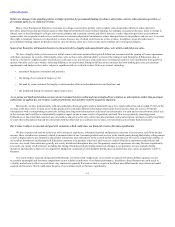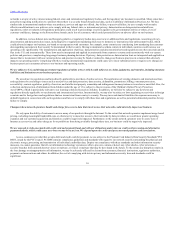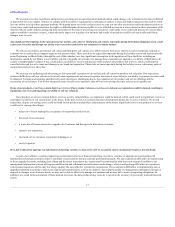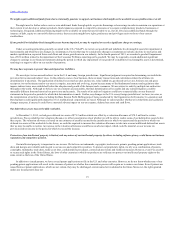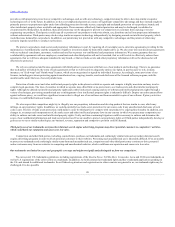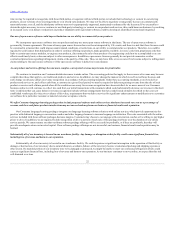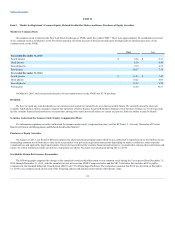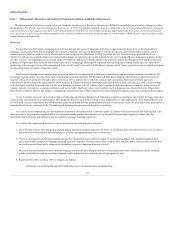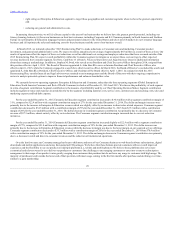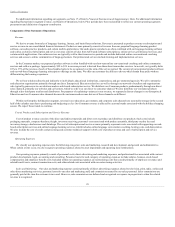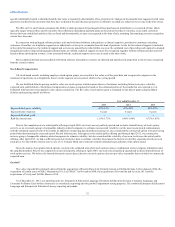Rosetta Stone 2015 Annual Report Download - page 23
Download and view the complete annual report
Please find page 23 of the 2015 Rosetta Stone annual report below. You can navigate through the pages in the report by either clicking on the pages listed below, or by using the keyword search tool below to find specific information within the annual report.
Table of Contents
time we may be required to renegotiate with these third parties or negotiate with new third parties to include their technology or content in our existing
products, in new versions of our existing products or in wholly new products. We may not be able to negotiate or renegotiate licenses on commercially
reasonable terms, or at all, and the third-party software may not be appropriately supported, maintained or enhanced by the licensors. If we are unable to
obtain the rights necessary to use or continue to use third-party technology or content in our products and services, this could harm our business, by resulting
in increased costs, or in delays or reductions in product shipments until equivalent software could be developed, identified, licensed and integrated.
Our use of open source software could impose limitations on our ability to commercialize our products.
We incorporate open source software into our products and may use more open source software in the future. The use of open source software is
governed by license agreements. The terms of many open source licenses have not been interpreted by U.S. courts, and there is a risk that these licenses could
be construed in a manner that could impose unanticipated conditions or restrictions on our ability to commercialize our products. Therefore, we could be
required to seek licenses from third parties in order to continue offering our products, make generally available, in source code form, proprietary code that
links to certain open source modules, re-engineer our products, discontinue the sale of our products if re-engineering could not be accomplished on a cost-
effective and timely basis, or become subject to other consequences. In addition, open source licenses generally do not provide warranties or other
contractual protections regarding infringement claims or the quality of the code. Thus, we may have little or no recourse if we become subject to infringement
claims relating to the open source software or if the open source software is defective in any manner.
As our product and service offerings become more complex, our reported revenue may become less predictable.
We continue to transition our Consumer distribution more towards online. The accounting policies that apply to these sources of revenue may be more
complex than those that apply to our traditional products and services. In addition, we may change the manner in which we sell our software licenses, and
such change could cause delays in revenue recognition in accordance with accounting standards. Under these accounting standards, even if we deliver
products and services to, and collect cash from, a customer in a given fiscal period, we may be required to defer recognizing revenue from the sale of such
product or service until a future period when all the conditions necessary for revenue recognition have been satisfied. As we move more of our Consumer
business online we will continue to collect less cash from our initial transactions with consumers which could substantially decrease our revenue in the short
term. Conditions that can cause delays in revenue recognition include software arrangements that have undelivered elements for which we have not yet
established vendor specific objective evidence of fair value, requirements that we deliver services for significant enhancements or modifications to customize
our software for a particular customer or material customer acceptance criteria.
We offer Consumer language-learning packages that include perpetual software and online services that have increased our costs as a percentage of
revenue, and these and future product introductions may not succeed and may harm our business, financial results and reputation.
Our Consumer language-learning packages integrate our language-learning software solutions with online services, which provide opportunities for
practice with dedicated language conversation coaches and other language learners to increase language socialization. The costs associated with the online
services included with these software packages decrease margins. Customers may choose to not engage with conversation coaches or be willing to pay higher
prices to do so. In addition, we are required to defer recognition of all or a portion of each sale of this packaged software over the duration of our online
service periods. We cannot assure you that our future software package offerings will be successful or profitable, or if they are profitable, that they will
provide an adequate return on invested capital. If our software package offerings are not successful, our business, financial results and reputation may be
harmed.
Substantially all of our inventory is located in one warehouse facility. Any damage or disruption at this facility could cause significant financial loss,
including loss of revenue and harm to our reputation.
Substantially all of our inventory is located in one warehouse facility. We could experience significant interruption in the operation of this facility or
damage or destruction of our inventory due to natural disasters, accidents, failures of the inventory locator or automated packing and shipping systems or
other events. If a material portion of our inventory were to be damaged or destroyed, we might be unable to meet our contractual obligations which could
cause us significant financial loss, including loss of revenue and harm to our reputation. As our business continues to move online, we expect that this risk
will diminish over time.
22



